Interview -- with Brad Walseth
Bobby Lewis - Chicago's Lyrical Master of the Horn

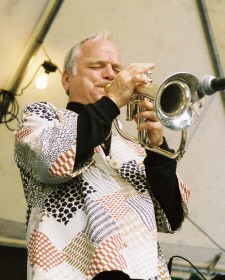
Bobby Lewis
Chicago's Lyrical Master of the Horn
Interview with Brad Walseth
July 10, 2007
Photos
from Jazz Fest by Brad Walseth
Other photos courtesy Bobby Lewis
Throughout its history, Chicago has been home to some of the greatest trumpet players in the world. Louis Armstrong, Freddie Keppard and King Oliver held long standing positions in Southside nightclubs, and Bix Beiderbecke got his start here — while on the modern front, players like Jon Faddis, Corey Wilkes, Art Hoyle, Orbert Davis, Art Davis and Tito Carillo in jazz, and the members of the CSO's the classical side storied brass section on the classical side, all contribute to Chicago's reputation as a mecca for exceptional trumpeters.
One of the leading members of this exclusive fraternity is trumpeter/flugelhorn master Bobby Lewis. Lewis has been a top Chicago session musician who has played on over 7,500 recordings including numerous TV and radio jingles and film scores, Curtis Mayfield & Jerry Butler R&B and soul records in the '70s and records by The Buckinghams and Alice Cooper(?!). He has also released nine recordings as a band leader, including 2006's “Instant Groove.” The horn player has appeared around the world with top classical orchestras, his own band, as well as Dixieland bands, traditional combos and big bands and even avant garde experimental groups. Lewis has received numerous awards, including two music composition fellowship grants from the National Endowment for the Arts. Along the way, Lewis played with Benny Goodman, Claude Thornhill, Bill Conti, Benny Carter, Skitch Henderson, Marion McPartland and Henry Mancini and accompanied some of the greatest singers in jazz history including Frank Sinatra, Ella Fitzgerald, Tony Bennett, Sarah Vaughn, Judy Garland, Mel Torme, Sammy Davis, Jr., Rosemary Clooney, Harry Belafonte and Peggy Lee.
Lewis possesses an enviable array of skills. His technical prowess is exceptional, and he can play fiery licks with the best of them, but it may be the horn veteran's incredible way with a ballad that truly sets him apart. Perhaps the most lyrical horn player in the world, Lewis' rich, velvety tone is enough to make a stone weep. No wonder his talents have made him so much in demand.
Lewis is headlining the Glen Ellyn Jazz Fest, July 14. Bobby graciously took some time out to talk to JazzChicago's Brad Walseth, to share some stories and offer some astute, yet surprising advice to young musicians. In our conversation, Lewis is revealed to be one of the kindest, most humble and generous humans we've met in the jazz arena. We hope you enjoy!
![]()
Jazz Chicago: So you're playing out in Glen Ellyn this weekend - how did that come about?
Bobby Lewis: Well Ken Scott from WDCB is a good friend of mine, and as you know he plays Chicago artists' CDs on WDCB quite often -in fact they feature a lot of local people and that is great for us. He's just a great guy for that, and he asked me if I wanted to be the headliner (we're all headliners as far as I'm concerned) for this jazz festival and I said sure , let me get the group together. He's just one of my great friends, and I'm very indebted to him for doing this.
JazzChicago: I'm really looking forward to it - who's going to be playing with you?
Bobby Lewis: Well, my main man, Jim Ryan on piano of course, Pat Mallinger - who you know is just a giant on tenor saxophone, and seeing as our bass player Thomas Kini passed away (in 2004), Stewart Miller is playing bass, and Bob Rummage on drums, who's a wonderful player, and Alejo Poveda on percussion. Alejo and Jim have been all my Cds and Pat probably on the last 4 or 5.
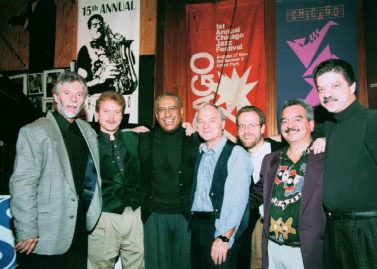
JazzChicago: You've recorded 9 CDs as a leader haven't you?
Bobby Lewis: Yes that's correct. 7 in the current series and two reissues - one by "The Forefront," which was a trumpet group I had in the 1970s - 1972-1980. A series of events caused that group to discontinue playing together - one of which was a serious accident by one of the trumpet players. That was in 1980, and as you know it's very hard to replace a player of that nature in a group like that. And so we recorded 2 albums - LPs they were at the time - and I had several other tapes of performances and things by that group with other additional players that I wanted to reissue because it was such viable music, and you know yourself nobody plays LPs anymore.
JazzChicago: (laughing) Actually I still do.
Bobby Lewis: Well I do too, but there's that whole group of people that - the smaller the better - they put it on ipods and they don't even worry about Cds anymore.
JazzChicago: Have all of your releases been on Southport?
Bobby Lewis: Well, yes, the seven of them anyway. And the other reissue was by a group called the Rhythmmakers that played together for about 15 years at Andy's Jazz Club. Which included Barrett Deems and Truck Parham and Joe Johnson, and at the time Eric Schneider was playing with us. Somebody wanted to give me some money to record the group so they could present Christmas presents to their clients, and he said I don't care what you do with it after that, I just want the initial cassettes - it was issued on cassette - that's another medium that has gone by.
JazzChicago: (laughing) I've still got tons of them.
Bobby Lewis: (laughing) Well I've got an automobile that still plays cassettes - I'll try to keep that forever.
JazzChicago: You're lucky - those are hard to come by nowadays.
Bobby Lewis: That was great music too, and Joe Johnson had just passed away and I thought - this music is too good, and it's very much a cross section of what was happening at Andy's - you know the live music there. And so with Barrett Deems having passed and Truck as well - I thought this was too good to just keep - [I wanted] to just keep it out there in the path you know on CDs as well. So all these have been labors of love, Brad. You know what that means?
JazzChicago: I sure do.
Bobby Lewis: Somebody said you've got million sellers - that means you've got a million in your cellar.
JazzChicago: (laughter) That's a good one!
Bobby Lewis: Very true.
JazzChicago: When you're playing this weekend, are you going to be playing some numbers off your latest Cd - "Instant Groove"?
Bobby Lewis: Probably some, but probably a cross section of all of them. We have an hour and a half which allows us to play 6 or 7 tunes. But it will be a nice set and -- by the way thanks for the compliment about the Chicago Jazz Fest last year.
JazzChicago: I loved that set you played last summer.
Bobby Lewis: Well thank you. There'll be a lot of the same notes on this one.
JazzChicago: (Laughter) Do you promise?
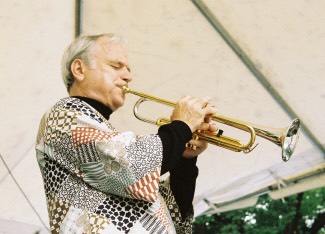
Bobby Lewis: Yeah, with that group you can't miss. And there are a certain set of tunes that we like to play, but I vary you know. I hate to get into any ruts, but of course we don't really perform all that often anyway to get in any ruts. Playing the same music over and over again, I tend not to do that, with one exception. I've always been enamored with the tune "Land of Make Believe" which was Chuck Mangione's big hit. In fact I recorded it on my first
CD, and before I went on the Southport label I presented it to one of the major/minor labels and the first thing the guy said was you can't put "Land of Make Believe" on there - that's Chuck Mangione's tune. Well for instance - let's go back to "I Can't Get Started" which Bunny Berrigan recorded it and so did Dizzy Gillespie. And they were both classic recordings of it - so who owns the tune? I mean it's his tune, but that doesn't prevent the rest of us from stretching out on it. I said forget it, I can't replace that, but at that point Joanie and Sparrow were starting their label up, so I said let's go with that. That's one I usually like to play - but I don't know if we will play it this weekend, but I know we did play that at the (2006) Chicago Jazz Fest. People seem to like that melody - they say "Oh boy, that's a great melody."
JazzChicago: Well you are a very melodic player.
Bobby Lewis: I've always been that way. Some of my early influences were - the earliest ones were Bobby Hackett and Chet Baker that kind of ilk. Very lyrical players. Of course, then I heard Louis Armstrong and went - "Whoa! This is the guy I want to sound like."
JazzChicago: Well you can go both ways - that's one of the striking things about your talent.
Bobby Lewis: I've always thought that - even at a very early age - that I wanted to play all types of music. I thought that to be a trumpet player you really should know how to play all of it.
JazzChicago: Now you grew up in Oshkosh, is that right?
Bobby Lewis: In Wisconsin, yes that's right.
JazzChicago: Was your family musical?
Bobby Lewis: On the Lewis side of the family - which was basically Welsh - yeah, that was the musical side of the family. My mother's side of the family - my dad always said they couldn't carry a tune in a bucket. But the Lewis side - my dad was a musician - a part-time musician - he really couldn't make a living at music.
JazzChicago: What did he play?
Bobby Lewis: Trombone. And one of my other uncles played trombone, and my other uncle was a music teacher in the grade schools - then he went on to be the high school band director. In fact when I got into high school - so I was under him for my whole schooling.
JazzChicago: What was your first gig, do you remember?
Bobby Lewis: My dad kind of chartered a band under my name - I guess he just wanted to give me some experience - and I was probably around 14 years old at the time. And we were to play at one of the parks where they used to present visiting bands - road bands - called a dance hall for the summer. In the parks that they had, they had dance pavilions. They wanted us to play a dance out there, and only six people showed up. (laughter) But my dad said you have to pay us anyway. I got something like $50 for doing that. In those days - you're talking about maybe 1950 - 51 - that was a lot of money back then in 1951. I mean guys play for that now.
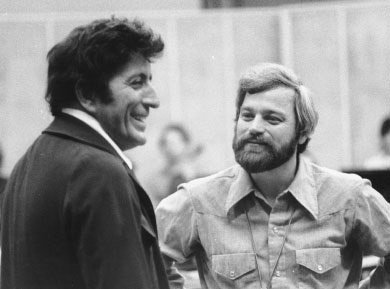
JazzChicago: Did you go straight from Oshkosh then to school at (the University of Wisconsin) Madison?
Bobby Lewis: After I graduated from high school yes, then I went and was a music major at Madison - mainly because my folks couldn't afford much tuition, as well as I couldn't either. There the tuition was $60 a semester - and my brother and I went to college - he was a year older than I was - and we stayed at my aunt and uncle's house that semester. So essentially the school wasn't very expensive then for an
in-stater - that was about all we could afford. I would have preferred to have gone to a music conservatory, but I had to take what I could at the time.
JazzChicago: Sure, but you do feel like you got a pretty good education in music at Madison though, don't you?
Bobby Lewis: Uh huh, yeah. From peers in fact - the guys that you go to school with - you learn from them actually almost more than you learn from your curriculum activities. Because guys are playing jazz and you'd listen to them and play with them, and hang out and talk about jazz and stuff. There was a guy named John Phillips in Madison that had an immense record collection of 78s - old type jazz. And anytime anybody wanted to go over and listen to jazz he'd be willing to play as long as you could stay awake. A lot of times on a Saturday night he'd have a party out there for musicians that wanted to show up and you'd end up leaving there at 3 or 4 o'clock in the morning having listened to all this music. But now that's an education you don't get in college.
JazzChicago: So you were studying classical music by day, while at the same time studying jazz by night by listening to all these records?
Bobby Lewis: Well it was like that. In fact at that time at the University of Wisconsin at the time they didn't even allow us to play jazz in the practice rooms. Although I thought they couldn't tell a flatted fifth from a sharp fourth or an augmented. They didn't know what we were doing (laughs).
JazzChicago: Do you think your classical background has contributed to your ability to play jazz? Do you think it helped?
Bobby Lewis: Well, the basics are always the elements of scales and chords and it applies to everything and every type of music. You always have to learn the basics. You have to learn how to play your instrument. It's all relevant. The better you learn your instrument - I mean jazz players have always practiced a lot. They have to practice scales and chords, and a lot of them play etudes too - just because it's all the same - it's all relevant.
You learn your instrument and then from that point, creativity takes over, and your ear. And whatever elements of that that you have - and if you have a creative sense and good time then you can apply that to jazz and classical as well. I really wanted to be a complete trumpet player - so later on in my life when I did all this recording work as a studio musician - TV and radio commercials, record dates, films and everything - there was a lot of improvising and creativity that needed to be applied to that. You had to understand just about every type of music in order to perform that on recordings. That was a great asset that I possessed that made me successful in the recording studio.
JazzChicago: I recently heard a jingle that Bruce Bendinger did that I believe you played on.
Bobby Lewis: Probably so, I did a lot with Bruce.
JazzChicago: So, did you go straight from college to backing up Sinatra and Tony Bennett and Ella Fitzgerald and people like that?
Bobby Lewis: After I was playing with Dave Remington - who just passed away 3 weeks ago or so - and I was playing with him at the Wagon Wheel Lodge - right after I got my master's degree - and then I didn't have any deferments left - so Uncle Sam took me in the draft. I was changing places with a trumpet player named Dick Oakley who was with Jack Teagarden's band - he was going to join Dave's band and I was going to join Jack Teagarden, but instead I joined Uncle Sam's band. I spent 21 months in the service.
JazzChicago: What year was this?
Bobby Lewis: That was 1958 - I got my notice on Dec. 4th - it was my mother's birthday.
JazzChicago: Happy birthday, Mom.
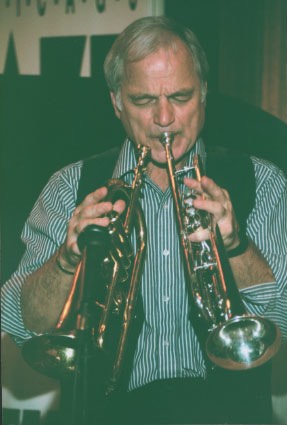
Bobby Lewis: Yeah, it was a dark day. Going from South Beloit into the Army. I've got so many stories about that we won't get into. And then I got out 3 months early to go back to school - so I went one semester and took very little - had very few hours. No money, but a lot of time to mess around. So then I rejoined Dave at the Wagon Wheel and the band got fired right away. But then he brought a band to Chicago in January of 1961, and then I moved here and pretty much settled here at that point. And then I started working with a lot of different jobbing bands here in Chicago and I was at Jazz Ltd., which was a jazz club on Grand that had a house band and basically a dixieland band. And then I played with Art Hodes - there were a lot of jazz clubs in Chicago in the very early '60s, and then when rock and roll came in they all seemed to go under. There was a lot of clubs on Rush Street and around that area that hired bands - you could make a living very easily. And of course living in Chicago wasn't that expensive then either. In fact I was living on Grand Ave between Wabash and State - now that's where the Container Building is right? Before that building was there they had street flats along Grand there. I was living in the basement apartment of one of them for $90 a month. You could park your car at the garage then for $15 a month. I was making about $140 a week - when they paid us. Playing in one of the mafia joints - there were a lot of them then. (laughing)
JazzChicago: So how did you come to the attention of the big name stars you ended up backing? Did they just happen to come through town and hear you?
Bobby Lewis: At that time there were a lot of showplaces, you know - the Sherman Hotel, and the Boulevard Room at the Hilton would present acts, and the Palmer House and the Drake - there were a lot of different venues where these star performers would come in and hire a band - play two weeks or a week and they always needed musicians to play for them. And McCormick Place had shows come in there. Most of these stars have passed on now, but that is almost a thing of the past where they have bands and orchestras play for all these stars, because they aren't around anymore. So I would play for all these people when they came in - or sometimes it would be a corporate show where it would be a one appearance thing. But that's how I played with all these people. When I think about it - it's mind-boggling. People ask me about some of these certain old performers and I'll say - I played with him, I played with them... It was just a great time to be a musician in the '50s, '60s, '70s.
"A sound like no other. I like him best when he plays in pastels, but every note is beautiful...is loving. Bobby loves life as he loves music...and I love Bobby Lewis." - Peggy Lee - 1995
JazzChicago: Can you talk about Peggy Lee - weren't you her musical director at one time?
Bobby Lewis: I conducted two shows for her - one was in St. Louis and one was in Toronto. It was kind of different for Peggy, because she always had a piano player conducting. So to be a trumpet player conductor was quite unusual for her. It presented some problems for her with not having a conductor/piano player. But the shows went well, and after that she really wasn't on the road much. Mill Run and those playhouses were closing - so they didn't have as many venues to work in, and economics was taking over as a problem for a lot of these places.
JazzChicago: I believe Sinatra said he learned a lot about phrasing by listening to Dizzy Gillespie, did you learn anything from listening to the great singers you played with?
Bobby Lewis: That's a great question because I listened to Frank Sinatra a lot - and a lot of time his ballad albums he did with Gordon Jenkins - "Where are You?" and "No One Cares," and I always had tapes for musicians and I'd say listen to this - listen to this phrasing. Of course Frank's jazz phrasing was just great, and you can learn a lot from listening to singers and they in turn would listen to jazz musicians. Ella learned a lot of her scat singing by listening to people like Lester Young and Dizzy Gillespie and those kind of people, as well as Tony Bennett did too, and still does, I'm sure. It's a give and take situation - we all learn from each other.
JazzChicago: Well you must have a million stories about working about all these different people - do you have a really funny story you'd like to share?
Bobby Lewis: If I can come up with one that you can print (laughing). Well let's see, we actually there was a really funny story that happened when I was with Jack Teagarden- and you know who Barrett Deems was - a great drummer who played with Louis Armstrong. Well we were playing this club in Jacksonville and Barrett was playing this drum solo - we'd always play "When the Saints Go Marching In" and then Barrett would play a 15 minute drum solo. Well, Barrett had false teeth. So he was playing this solo and his upper plate fell out, bounced on the tom tom and landed in front of the drums. I was just roaring - I'd never seen anything so funny. And Jack Teagarden was a very suave person - at this point, and with much aversion I should say, picked up Barrett's teeth and handed them to him and Barrett shoved them in his mouth and continued his drum solo and I thought oh my gosh - what's on those teeth? (laughing) And we still had to finish the tune and I couldn't play. He's going - "come on, play." And afterwards he said how come you wouldn't play? I said - "that was so funny I just couldn't play." But there's a whole lot more, let me tell you.
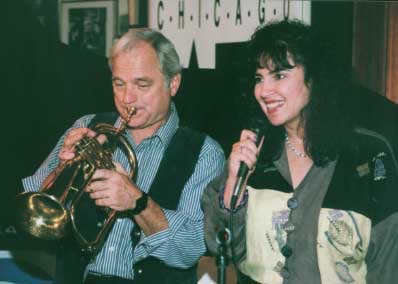
JazzChicago: You should write a book.
Bobby Lewis: Well I have been starting to write some stories about different experiences with all these people - there's really a lot of them.
JazzChicago: So I'm curious as to what's your opinion about today's music and especially today's jazz music?
Bobby Lewis: My opinion is that things keep evolving, and there are so many great young musicians of the highest caliber, but one of the problems is - where do they play? And how can they make a living like we did? And experimentation - which I was always a part of - I played with George and Hal Russell in the late '60s. Avant garde music - people were listening to it, but a lot of people would scratch their heads when they heard it. And experimentation is great - I can't always agree with a lot of things that they do, but of course what do you listen for in music? Do you like melody, do you like harmony, do you like dissonance? Everybody has different preferences as far as their taste in music. And some people can say ah there's not any music anymore like they made in the '40s and '50s - well things evolve. There's different types of music - there's all different cross sections. Fusion music means fusing two different types of music together - sometimes it "con-fuses" and sometimes it "dif-fuses." I think there's always room for experimentation in music - it's just the directions it goes, who knows? If someone could predict that they'd be billionaires.
JazzChicago: So do you have any advice for younger jazz musicians trying to make it in the business?
Bobby Lewis: I always tell my students to learn electronics and computers because it will help you in all phases of your life. With music , if you want to put out an album you can put a lot of backgrounds with computers and save a lot of money because it's expensive to do. If you want to put out Cds you can do that inexpensively. So to know that part of music - computers - is beneficial to you.
As far as making a living at music, I don't know what to tell young musicians. I guess just hang in there because the cream always rises to the top and the best musicians will find a way to make it. Teaching is a profession that a lot of guys from my era and the later eras are doing. Teaching in colleges and high schools and privately... because everybody always wants to get better and you've got to have somebody with experience to teach them. So that's a way of surviving. Otherwise, just keep plugging. Like Clark Terry says - "Keep on keeping on."
JazzChicago: Uh huh.
Bobby Lewis: I've got a great story about Clark Terry. One time we were playing the Fond Du Lac (WI) Jazz Festival with Clark Terry, and Art Hoyle was booking a 17-piece band for Clark, basically all jazz musicians for a one-concert thing. So we got to the rehearsal and we were there before Clark was. And the band was just hanging around and then Clark finally comes in with his manager and he said "Well, where are the charts?" And Art was like - "I thought you were going to bring them." And we were doing a tribute to Duke Ellington.
JazzChicago: Oh no!
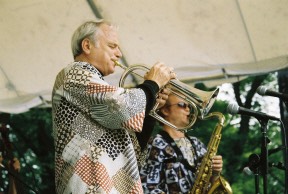
Bobby Lewis: And Clark was like "Well...let's get up on the stand and rehearse and see what we can come up with." Well, with Duke Ellington you've got thousands of ideas - Clark played with Duke and everything you know, and Clark's a very creative guy. So, we got up there and rehearsed a few tunes, and Clark is calling out riffs, and it was working pretty well - I mean here's 17 guys without a note of music. And then after about 35-40 minutes, Clark said "let's all go eat." We were wondering, well okay, but we went to the concert and Clark winged the whole thing. Nobody knew we didn't have any music. About a third of way through, I guess he told the people we didn't have any music. He did this whole 2 1/2 hour concert without any music and it was just great - he was a genius - Clark Terry - one of my all time favorites on the trumpet. You know Brad, the final outcome of this was that the Fond Du Lac Jazz Festival brought a lawsuit against Clark for not having any music.
JazzChicago: What?!
Bobby Lewis: That's what he said. I mean what's this? They were witness to a genius at work - pulling off a concert like this. One tune he went around the band and told the guys - everybody play two choruses of blues - that's the type of band it was. And it was just amazing to see this guy working. I guess they finally just dropped their lawsuit. That they would even think about doing that to Clark after what they witnessed was just beyond comprehension.
JazzChicago: Speaking of one of the old timers, did you know Maynard Ferguson at all?
Bobby Lewis: I played with him at the Plugged Nickel - I think it probably was in the later '60s. It was when Wells Street was going very well, Old Town and all that area. It's right around the time that Miles did his Plugged Nickel sessions and it was right before Maynard went to London - I think he spent a couple years there because the IRS was on his case for not paying his taxes. Maynard was living on a bus that was parked in the parking lot with his wife and his kid and - Maynard was pretty out of it then. It was a small - it was a 13 piece band - all Chicago guys. Muhal Richard Abrams was the piano player, Richard Evans was the bass player, Sandy Mosse and Joe Daley were in the sax section, Johnny Holland, Art Hoyle and myself were in the trumpet section. I mean it was an all-star band, and we played two weeks there. So I did get a chance to play with him.
JazzChicago: And Maynard's living in the bus in the parking lot?
Bobby Lewis: (laughing) Yeah, he was living in the bus. He wanted his money in cash right away, and the club said no no no no - you've got to play your two weeks then we'll pay you. But he was playing very well - he always could. I'll never forget when I first heard his first recording - the 78 with Stan Kenton - doing "What's New" and "Hot Canary" - you know those two versions where he's playing all those double-Ds. Somebody played it for a music appreciation class - the teacher at high school - I went "Whoa! What is this!" I never wanted to play like that, but I could sure appreciate what he was doing.
JazzChicago: Well, here's a really important question - with all your talent it seems you could've gone anywhere, yet you chose to stay in Chicago - why?
Bobby Lewis: Well, there were a couple reasons - I was starting to work here, then I went on the road with Tex Benecke and the Modernaires - it was a Tribute to Glenn Miller show - it was basically a Las Vegas and L.A. band and I went with them. This was 1964 - I'd been with Jack Teagarden before that, but I was pretty much based in Chicago. Then when I got back, I started to do some studio work - vocally and instrumentally - the vocals paid a lot more than the instrumental sessions. I was starting to do a lot of things like that and there were certain people around me here that were my mentors - so I thought wow - I think it's happening here. I had a chance to go with the Modernaires as a singer in 1964 right after this tour, but I would have had to move to L.A. And I didn't think I wanted to move to L.A. To be a singer. Of course I'd probably would have had a lot more money if I would have (laughing). Maybe or maybe not. But anyway there was Warren
Kime, and Johnny Howell were here - a couple of very influential trumpeters in the studios and just great artists. And they kind of took me under their wing giving me suggestions, recommending me for sessions and all kinds of work. I enjoyed playing with both of them - Warren is still alive - he lives in Florida. So that was one reason.
The other reason was Bud Herseth - who was principal trumpet player in the Chicago Symphony Orchestra for 53 years. And he was... I thought - I want to be a part of Chicago. I loved these players and - not that weren't players elsewhere, but these were friends of mine. Then I started to do so much work that there was no point in going anywhere else. And New York was New York, and being from Oshkosh, Wisconsin, I didn't know if I wanted to be part of that big metropolis. In New York I think you really have to get used to living there - and all the hustle and bustle of that city. But there was a lot going on in different places, but New York and L.A., those places just weren't that attractive to me as Chicago - so I just decided to stay here and try to make it here.
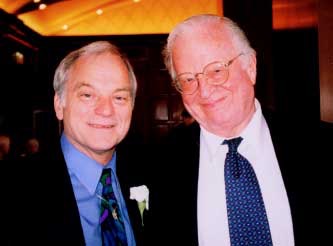
JazzChicago: You're a Midwest guy at heart.
Bobby Lewis: Well, yeah I guess so. That was part of it too - I could be close to my folks, and at that time I was married back in '67 - I have a daughter born in 1967 and two grandchildren, and so that was part of my staying here too.
JazzChicago: Well Bobby, I really appreciate your taking the time to talk with me. Do you have anything you'd like to say in conclusion?
Bobby Lewis: Well, just that the group that I'm playing with - I feel fortunate to be in company with such great world-class musicians. We always like to play together, we love to play together, and we like each other. There's a few players who couldn't make this particular concert that I use that are part of the group too, but I just feel fortunate to be part of this world-class music and musicians.